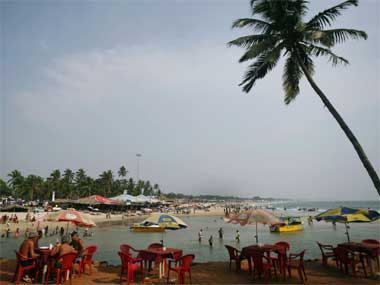By Mayabhushan Nagvenkar Panaji: After a couple of Goan villages formally resolved to ostracise Nigerians last week, Kashmiris may be next on Goa’s discrimination radar. On Sunday, a storm kicked up at picturesque southern beach village of Majorda, otherwise known for its tranquil beaches, over the issue of Kashmiris conducting businesses in the village jurisdiction.  The village gram sabha, which witnessed a strong turnout, also passed a resolution to revoke licences granted to Kashmiris to conduct businesses, even as Sarpanch Mozes Vaz told Firstpost that most businesses in the village were “officially conducted by local residents”. “Kashmiris are mostly either small partners or managers. But I have assured the village gram sabha that I will conduct a survey of all business establishments in Majorda panchayat area to see if any place is run by a Kashmiri. I will take action against it,” Vaz said. Vaz’s statement and the uproar in the Majorda village panchayat appears to be an extension of the rural Goa’s social discriminatory trend. Two villages namely Siolim-Sodiem and Parra have formally resolved to ban Nigerian students from renting rooms in the village jurisdiction by threatening to fine house-owners. “They come here. Live on fake papers, deal in drugs and cause a lot of nuisance,” according to Parra Sarpanch Delilah Lobo who, while passing the formal resolution, had claimed that Nigerians were “troublesome”. The ‘ostracising’ of the Nigerian community in parts of Goa was fuelled by a riot-like situation with over 200 Nigerians on 31 October, taking on both locals as well as policemen, as they blockaded National Highway-17 demanding consular presence during the post-mortem of a murdered colleague allegedly by a local drug mafia. The incident triggered a knee-jerk reaction from the state government, which initiated a drive against all foreigners living in Goa on inadequate documents, which includes the several hundred Nigerians living in Parra alone. While Kashmiris have been conducting businesses in Goa involving sale of curios and carpets especially in the coastal areas, for more than the last couple of decades a spate of arrests of Kashmiris for drug peddling over the years has also led to tensions between the local community and Kashmiris. In March last year, the state police made it mandatory for the nearly 3000 Kashmiris migrating to Goa seasonally, to fill up ‘Stranger Rolls’, a document meant to keep track of migrant communities, which helps the police keep a watch on specific activities of the enrolled individual. Kashmiris generally arrive in Goa for the tourist season from October-March to set up their businesses before moving back home. The ‘Stranger Roll’ move had triggered outrage in Jammu and Kashmir with the People’s Democratic Party (PDP) calling the move “ridiculous and insulting”. But police as well as other enforcement agencies suggest that several handicrafts and carpet stores along the beach belts operated as fronts for narcotics trade. Yashodhan Wanage, a former zonal director of the Narcotics Control Bureau for Goa and Maharashtra even claimed that young Kashmiris, mostly unemployed were also used as mules to carry narcotics from the drug producing northern regions of the country to Goa and Maharashtra and that arrests made by the NCB was proof of it. “The number of youths being used as drug mules is on the rise. They are being lured with easy money by suppliers. A trip to Mumbai is an additional incentive,” according to Wanage. A Kashmiri who operates a precious gemstone business in Calangute, which has a concentration of Kashmiri-run businesses said that harassment by police and hostility by the local residents was common place. “The police always threaten us with closing our business before a tourist season to increase their protection money cut. We have also been forced to pay local gangs too to ensure that we can carry out our business for these six months (October-March),” said the trader, requesting not to be quoted.
On Sunday, a storm kicked up at picturesque southern beach village of Majorda, otherwise known for its tranquil beaches, over the issue of Kashmiris conducting businesses in the village jurisdiction.
Advertisement
End of Article
Written by FP Archives
see more


)

)
)
)
)
)
)
)
)



